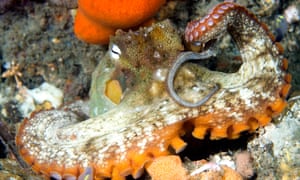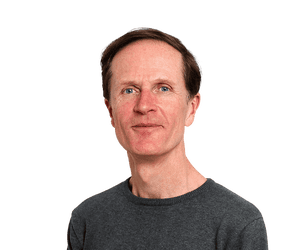https://www.theguardian.com/environment/shortcuts/2017/sep/18/octlantis-the-underwater-city-built-by-octopuses
If animals are our other, there is nothing quite so other as the octopus. It is the alien with whom we share our planet, a coeval evolutionary life form whose slithery slipperiness and more than the requisite number of limbs (each of which contains its own “brain”) symbolise the dark mystery and fear of the deep.
Now comes news that octopuses have been building their own cities down there. In a story straight out of James Cameron’s The Abyss, scientists have discovered that the wonderfully named “gloomy octopus”, octopus tetricus, are not the loners we once thought them to be.
In Australia, the species has been seen to congregate, communicate and even evict one another at a site marine biologists call Octlantis, at Jervis Bay, south of Sydney. Professor David Scheel, who led the research, draws direct comparisons with our own communities in his new report: “These behaviours are the product of natural selection, and may be remarkably similar to vertebrate complex social behaviour.”
The discovery is important in that it confirms scientists’ suspicions about the culture of cephalopods. Another nearby site in Jervis Bay, found 50ft below the surface in 2009 and named Octopolis, was thought to be an anomaly, formed around a large, human-made metal object. Peter Godfrey-Smith, author of Other Minds: The Octopus and the Evolution of Intelligent Life, who dived the site, saw it as a kind of “artificial reef”, an underwater island of safety in a dangerous area, a defence against predators such as sharks, seals and dolphins.
But the discovery proves that Octopolis is not a one-off. Lacking any human object at its heart, its aquatic architects have constructed walls from clam and scallop shells, the remains of their former meals. Not only that, but the report’s co-author, Stephanie Chancellor, notes that these piles “were further sculpted to create dens, making these octopuses true environmental engineers”.
One reason for these cephalopod urbs may be good food resources but, as with humans, octopus city life is no utopia. There is visible aggression as the inhabitants continually try to chase one another out of each other’s dens. But Godfrey-Smith concludes that these are multi-generational places that may concentrate the evolution of octopus brains. As such, they offer unique opportunities to observe the behaviour of animals said to possess the intelligence of a three-year-old human.
I’m not so sure it is a good idea. Here we are, in our bipedal hubris, worrying about AI, when all the while there is an alien life form in the oceans, getting ready for their own takeover bid.
Since you’re here …
… we have a small favour to ask. More people are reading the Guardian than ever but advertising revenues across the media are falling fast. And unlike many news organisations, we haven’t put up a paywall – we want to keep our journalism as open as we can. So you can see why we need to ask for your help. The Guardian’s independent, investigative journalism takes a lot of time, money and hard work to produce. But we do it because we believe our perspective matters – because it might well be your perspective, too.
I appreciate there not being a paywall: it is more democratic for the media to be available for all and not a commodity to be purchased by a few. I’m happy to make a contribution so others with less means still have access to information.Thomasine F-R.
If everyone who reads our reporting, who likes it, helps to support it, our future would be much more secure.


沒有留言:
張貼留言